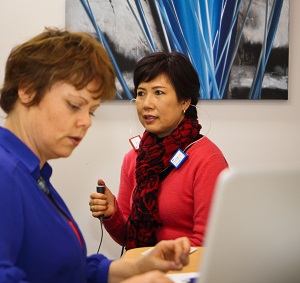Hearing loss – Me?

I wonder: What brought you to this page?
- Have you noticed that you have been missing the details more often?
- Are you struggling to follow along in a group conversation?
- Or - have other people suggested that you don't always hear them?
Hearing loss effects people of all ages. There are many reasons for hearing loss including hereditary factors, noise exposure, trauma and ear pathology. Hearing loss does become more common as we age.
Hearing loss is invisible
Hearing loss is painless
Hearing loss is gradual
Hearing loss is sneaky
In the beginning, hearing loss takes away...
- the beginning of the sentence,
- the little details,
- the punchline...
With time hearing loss may...
- ... increase mental fatigue - as you concentrate harder just to follow along- leaving you feeling exhausted at the end of the day
- ... begin to erode your confidence - as you are no longer sure about what was said
- ... cause you to ask for repeats - as you miss the first word
- ... lead you to feel embarrassed about missing the details or about having to ask for repeats too often
The gradual nature of hearing loss means that we adapt over time. We change our behaviour, we choose our environments and slowly our relationships change as everyone adapts to a change in our hearing.
Hearing loss is invisible and sneaky.
As it changes, we adjust.
Gradually it effects personality and relationships.
Hearing loss changes us over time.
Maree O'Sullivan
Effects of hearing loss on you
Having hearing loss does not usually mean that you stop hearing all sounds equally; the hearing loss pattern will depend on the cause of the hearing loss. People usually start losing hearing in some pitches and not in others. Some sounds will dull, become less clear, resulting in poorer understanding of speech especially in difficult listening situations - like in a group of people, hearing while the TV or radio are on in the background or hearing in a large echoy room. Although for some types of hearing loss (conductive) people hear well in noisy environments, where people are speaking loudly but do not hear quiet speech.
The way you respond to reducing hearing clarity will depend on your personality, the degree and shape of your hearing loss and how long your hearing has been deteriorating. Most people with hearing loss find it tiring to follow conversation, as their brain has to work harder to fill in all the sound gaps that they miss -
"...now was that See or Tea? Must be Tea - that makes more sense."
This is called auditory fatigue.
Often people find the tiredness from auditory fatigue gets worse at the end of the day. It can be harder to keep up with fast conversation, especially in a group or if people are facing away.
Many people tell me that they have felt embarrassed by their hearing loss at some point, either because they have mis-understood someone or they felt embarrassed asking for repeats. Some people find it easier to step back from the intense concentration they need to use to stay in the conversation and slip into their own thoughts. Others will talk more, as when you are talking you do not need to hear. Unfortunately, both of these options lead to change in relationships over time.

Hearing loss increases the energy required just to follow normal conversation, this may cause auditory fatigue by the end of the day.
Impact of Hearing Loss
Hearing loss impact varies between individuals and is influenced by many factors including degree and cause of hearing loss, length of untreated hearing loss and personality. We know hearing loss leads to social isolation, personality change and in some people increases the chance of anxiety and depression. Studies have also found a strong link between hearing loss and the development of dementia. This US article outlines the effects of untreated hearing loss in adults.
It takes up to 10 years to seek help with hearing loss
So why do we wait to do something about Hearing Loss?
- Hearing loss is invisible
- Hearing loss is gradual
- People are great at adapting to their situation and change in hearing
- Family members help to compensate
- There is a history of stigma around hearing aids
- There is a a history of poor technology in hearing aids
- We "just get on with it..."
- Change is hard! ... and takes motivation
- We don't understand what is involved in getting and using hearing aids...
- What is the process?
- What is the cost?
- Do I need to wear them all the time?
- How do I look after hearing aids?
Do you think you may have hearing loss?
Are you ready to take the first step?
The first step is to have a full hearing assessment. This will assess your hearing level as well as pinpoint where in the ear the hearing loss originates.
Hearing loss may be described as:
- conductive, where sound is blocked from reaching the cochlear (outer or middle ear)
- sensori-neural where the cochlear is not able to detect all the sounds
- an auditory processing disorder (APD) where the brain cannot process the sound it detects.

The discussion after the hearing assessment will give you knowledge and understanding about your hearing and it's effects your life at the moment. If you are ready and interested we will talk to you about the options we have for helping you with your hearing and what is involved. From here, it is up to you decide your next step.
Hearing aids are the most common and effective way to help people with hearing loss (once any medical reasons have been excluded). However, before trialing hearing aids it is important that you are ready in yourself, to go through the hearing aid process. It must be your decision, not someone else's...

So ...what was it that brought you to this page?
I hope this article helped you gain a greater understanding of hearing loss and its effects. Do you have more questions? I would love to read your questions and comments, please add them below, or read on to find out a bit more about what we can do to help if you do have hearing loss...


